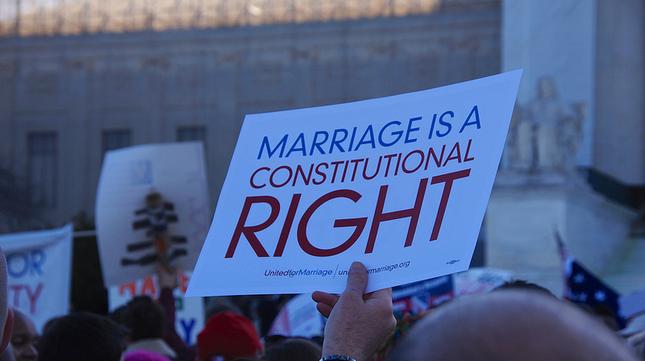SCOTUS: Summer of 2013 Decisions
By • July 18, 2013 0 1134

Supreme Court Strikes Down DOMA
With a 5-4 decision, the justices ruled June 26 that the Defense of Marriage Act (DOMA), passed and signed into law by President Bill Clinton, is an unconstitutional violation of the Fifth Amendment.
This part of the law restricted homosexual couples from receiving more than 1,000 benefits afforded to married heterosexual couples. This was without regard, even if the homosexual couples were legally married in the states where they resided.
Windsor v. United State was filed by New York resident Edith Windsor, who was legally married in Canada to Thea Spyer. Due to Spyer’s death in 2009, Windsor was required to pay estate taxes on her inheritance. This fee was lawful only because Windsor was married to a woman instead of a man.
Supreme Court Nixes Part of Voting Rights Act of 1995
On June 25, the Supreme Court struck down a key part of the Voting Rights Act of 1965. This portion of the law determines which states must get federal permission before they change their voting laws.
The Voting Rights Act requires nine states with a history of discrimination at the polls must get approval from the Justice Department or a special panel of judges before they change their voting laws. However, this applied mostly to Southern states.
Justice Roberts wrote for the court, saying, “Our country has changed, and while any racial discrimination in voting is too much, Congress must ensure that the legislation it passes to remedy that problem speaks to current conditions.”
Many civil rights activists called the decision devastating because it was thought of as the most important piece of civil rights legislation in American history.
Arizona Voter Registration Law Voided
On June 17, the Supreme Court struck down an Arizona voter registration law. The controversial law would require citizens to swear, under penalty of perjury, that he or she is a citizen.
The justices voted 7-2 to do away with Arizona’s voter-approved requirement. According to Justice Antonia Scalia, it “precludes Arizona from requiring a federal form applicant to submit information beyond that required by the form itself.” Scalia wrote for the court’s majority. The 9th U.S. Circuit Court of Appeals said that the National Voter Registration Act of 1993 overrides Arizona’s Proposition 200, because it doesn’t require such documentation.
Upon making its decision, the court was considering the legality of Arizona’s requirement that prospective voters document their U.S. citizenship in order to use a registration form produced under the federal “motor voter” registration law.
Opponents of the voter registration law were happy about this decision.”Today’s decision sends a strong message that states cannot block their citizens from registering to vote by superimposing burdensome paperwork requirements on top of federal law,” said Nina Perales, vice president of litigation for the Mexican American Legal Defense and Educational Fund. “The Supreme Court has affirmed that all U.S. citizens have the right to register to vote using the national postcard, regardless of the state in which they live,” Perales said.
In the past, Arizona has actively disagreed with the federal government over immigration issues, involving those concerning its border with Mexico.
Texas Affirmative Action Decision Pushed Aside
The Supreme Court has decided to sidesweep decision on the use of race-conscious school admission at the University of Texas and whether it violates the equal protection rights of some white applicants. Justices threw the case — Fisher vs University of Texas at Austin — back to the lower courts for further review.
The court has only affirmed the use of race in the admissions process. However, this makes it harder for institutions to use “race” policies to achieve a sense of diversity. This 7-1 decision ignores the larger constitutional issues.
Abigail Noel Fisher singlehandedly sued the flagship state university after her college application was rejected in 2008. This took place when she was a high school senior in Sugar Land, Texas. Fisher claims that the rejection was because she is white, and that she was being treated unfairly in comparison to someone than some less-qualified minority students who were accepted.
The school defends its policy of using race as one of many factors. Other factors such as test scores, community service, leadership, and work experience, designed to create a diverse campus are also taken into consideration.
Ultimately, the court reaffirmed earlier rulings allowing for a limited use of race-conscious public policies.”The attainment of a diverse student body serves values beyond race alone, including enhanced classroom dialogue and the lessening of racial isolation and stereotypes,” wrote Justice Anthony Kennedy in the court’s ruling.
“Strict scrutiny [of the policy] imposes on the university the ultimate burden of demonstrating, before turning to racial classification, that available, workable race-neutral alternatives do not suffice,” he said.
The decision on this case is expected to be released within the next few days.

